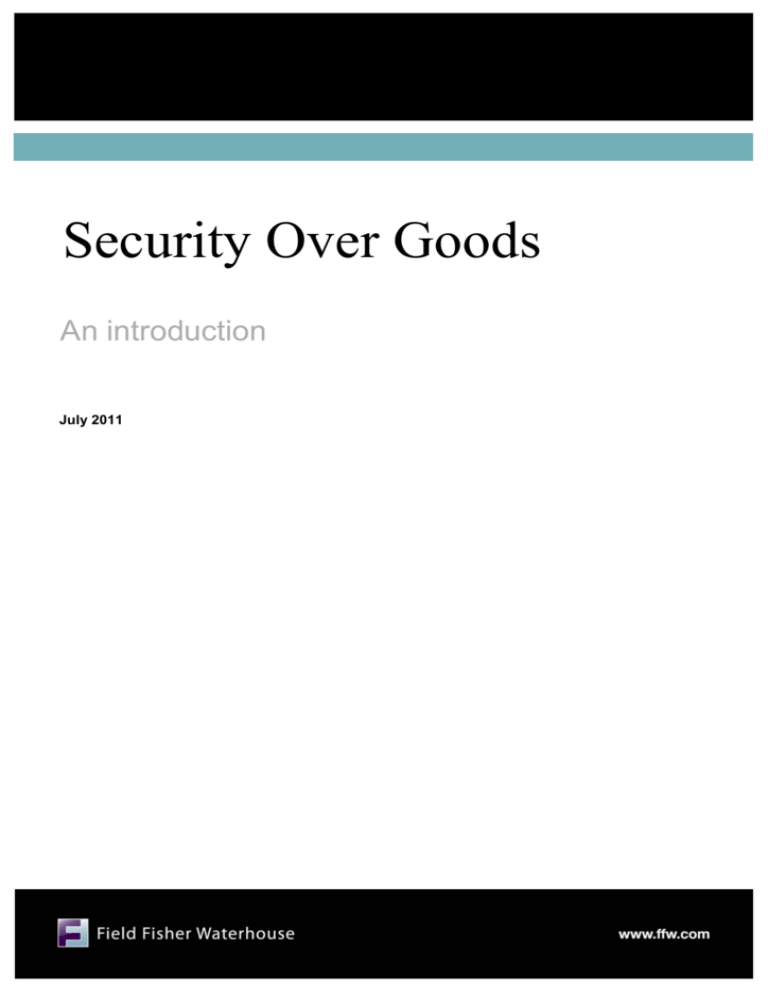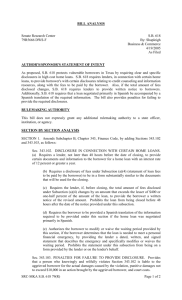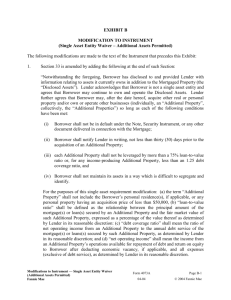
Security Over Goods
An introduction
July 2011
1
Security Over Goods
An introduction
There are a number of difficulties in taking security over
goods (or, to use the older term, “chattels”) as opposed to
other assets. This briefing paper is an introduction to the
subject, and highlights some of the key issues.
Form of Security
Under English law, security over goods may be in the form
of a mortgage, charge, pledge or lien. For the sake of
convenience, we refer to the person giving the security (the
mortgagor, chargor or pledgor) as the “borrower” and the
person taking it (the mortgagee, charge or pledgee) as the
“lender”.
Mortgage or charge
A legal mortgage (sometimes referred to in this context as
a “chattel mortgage”) involves the transfer of legal
ownership in the goods to the lender, subject to the
borrower’s right to re-transfer on repayment. The goods
must be in existence and owned by the borrower at the
time of the mortgage. The mortgage will be equitable
where, among other reasons, the borrower’s interest in the
goods is itself an equitable one, such as an interest under a
trust. An equitable mortgage may also be created where
some formality required for a legal mortgage is missing, but
this will not always be the case.
A charge involves an agreement by the borrower to give
the lender a proprietary interest in an asset as security for a
liability. In most cases this is done very simply by the
borrower executing a document by which it is expressed to
charge a particular asset as security for a particular debt.
The distinction between an equitable mortgage and a
charge is a narrow one. The charge is frequently to be
found as one of a number of “heads of charge” in a
debenture created by a company, and will extend to goods
“present and future”.
There are certain advantages in taking a legal mortgage
rather than an equitable mortgage or charge where it is
practicable to do so. In particular, an equitable mortgage or
charge will generally be overridden by a purchaser in good
faith of the legal interest in the goods without notice of the
lender’s security. Even a legal mortgage may, however, be
overridden under provisions in the Factors Act and Sale of
Goods Act mentioned briefly below, particularly when
goods are in the borrower’s possession.
2
Pledge
A pledge is an altogether different form of security. It
requires an actual or constructive delivery of possession
of the goods to the lender, and is considered in more
detail below. This should be distinguished from the
commercial usage of the term, where “pledge” is an
industry term used to cover the provision of security
otherwise than by title transfer, whether or not the legal
form of security is a pledge.
Lien
A lien is a right to detain goods until money owed has
been paid, and may be created by contract or implied. A
typical example is a right to detain goods that have been
repaired until the cost of repair has been paid. There is
uncertainty whether a lien on sub-freights is a registrable
charge or merely a personal right. Like “pledge”, the
term “lien” is also sometimes given a wider meaning in
commercial usage.
Identification of the subject matter
In order to create a security interest, the relevant asset
must be either identified at the time of the security
agreement, or identifiable as subsequently falling within
its terms. For example, a mortgage of 100 tons of
unidentified rice is no more than an agreement for a
mortgage. The lender will have no mortgage until a
particular 100 tons of rice is earmarked for the purpose.
However, the Sale of Goods Act 1979 (as amended)
makes a buyer who prepays goods forming part of a bulk
a proportionate co-owner of the goods. A lender
advancing money to the buyer against a bill of lading for
goods shipped as bulk cargo, under numerous bills of
lading, may therefore acquire a valid pledge of the
buyer’s share of the bulk.
Bills of Sale Acts and
registration requirements
A mortgage or charge by an individual or a partnership
(other than a limited liability partnership) over “personal
chattels” is subject to the Bills of Sale Acts 1878-1882
(the Acts). Most goods are personal chattels for this
purpose, but the Acts do not apply to ships or aircraft.
Unless it falls within one of a number of statutory
exemptions (including goods at sea or abroad), the
security will be void if it is not in the form required by,
and registered under, the Acts. In practice, these
formalities are cumbersome and unattractive to lenders,
such that taking a mortgage or charge over goods from an
individual is seldom practicable.
The Acts do not apply to security given by a company, but
such security generally requires registration at the UK
Companies Registry if the company is incorporated in the
UK or registered here as an overseas company. There are
currently proposals to remove the requirement in the case
of overseas companies. Registration does not, however,
constitute notice of the charge to a person acquiring goods
in good faith
If goods are purchased in the name of a company, or
transferred by an individual to a company, in order to
enable that company to create a mortgage or charge
outside the Acts, the purchase or transfer must be a
genuine one, and not a sham arrangement. The risk is
increased if an individual controlling the company is left in
possession of the charged goods.
Similarly, where a financing is structured as the purchase of
assets by the person providing finance, the courts will look
to the substance of the transaction and may disregard the
document as being a sham if it was intended to conceal the
fact that the transaction was a secured loan.
Floating charges
A mortgage or charge over goods may be fixed or floating.
In determining the nature of the security, similar issues
arise to those extensively reviewed by the courts in relation
to charges over receivables. If the borrower is given an
unrestricted right to collect receivables and to use the
proceeds to fund its working capital needs, any charge over
them is likely to be a floating one, however it is described.
An individual borrower may give a charge over assets such
as shares without concerns arising under the Acts. Shares,
cash and purely contractual rights are excluded from the
definition of “personal chattels” in the Acts. A floating
charge over all the assets of an individual will, however,
inevitably include personal chattels, and so fall foul of the
Acts. That is why, in practice, a floating charge over all
assets cannot be taken from an individual.
Since a charge over goods given by a company is not
subject to the Acts there is no particular difficulty in taking a
fixed charge from a company over items such as plant and
machinery if they are adequately identified in the charge. A
schedule of such items is often included but, depending on
what is secured, will often become out of date. While in
theory a fixed charge can be taken over assets such as
stock in trade, raw materials and goods in process, in
practice it is usually impracticable for the lender to
identify the items specifically and to retain sufficient
control over them to achieve anything other than a
floating charge.
In the case of Re Beam Tube Products Ltd [2006]
EWHC 486 (Ch) the court held that a so-called fixed
charge over plant and equipment created only a floating
charge. To achieve a fixed charge over goods of this
type the lender needs a sufficient control mechanism in
the charging document, and to apply that mechanism in
practice. An unrestricted right for the borrower to sell or
replace the goods without the specific consent of the
lender on a case by case basis is likely to render a
charge floating.
Pledges
It is sometimes possible to avoid the difficulties caused
by the Acts by taking security over goods in the form of a
pledge, rather than a mortgage or charge. A pledge
given by an individual falls outside the Acts. Even when
given by a company, a pledge does not generally require
registration at the UK Companies Registry. A pledge
vests a special property in the goods in the lender, and
confers a power of sale. It is also widely used in shortterm trade finance.
A pledge requires the delivery of possession of the
goods, or of documents of title to them, to the lender,
with the intention of creating a pledge. The delivery may
be symbolic: for example the borrower may hand over
the “keys to the store” where the goods are kept. More
modern practice is for constructive delivery to be given
by the delivery of documents of title to the goods, or by a
third party in possession of the goods undertaking to the
lender to hold them to its order (a process known as
“attornment”). The pledge must, however, arise by actual
or constructive delivery of possession, not under a
security document. There is no objection to there being a
collateral pledge agreement regulating the rights of the
parties, but if the agreement operates as a written
assignment passing title or an interest in the goods to
the lender, the document is likely to be a bill of sale,
requiring registration.
The only documents relating to goods that are
undoubtedly capable of being pledged (because they
are documents of title) are bills of lading and certain
3
Security Over Goods
An introduction
types of warehouse warrants (known as “statutory
warrants”) that are made documents of title under various
private acts of parliament. If a lender is offered other
documents, it must require the warehouse or custodian in
possession of the goods to attorn to it in order to obtain a
pledge. Bills of lading are documents executed on behalf of
the owner of a vessel and addressed to the shipper of
goods on board the vessel, which acknowledge the delivery
of the goods to the carrier. They are usually issued in a
number of copies, and a lender taking a pledge is well
advised to insist on receiving the full set of each bill.
The modern practice of using transport documents such as
non-negotiable sea waybills, which (unlike bills of lading)
are not documents of title, has weakened the security
available to lenders, forcing lenders to look to the
creditworthiness of their customers and to their overall
security arrangements with them – for example looking to a
debenture and guarantees – rather than the security
provided by documents relating to the goods.
Other forms of security
Letter of hypothecation
A letter of hypothecation is a type of equitable charge used
where it is impracticable to take possession of the goods or
documents of title to them. A letter in the traditional form
does not require registration under the Acts, because it falls
within an exception for documents used in the ordinary
course of business as proof of possession or control of
goods. But given the tendency to extend such letters to
include the proceeds of sale, and the “antiquity” of the
case-law, the safer course is to register them at the
Companies Registry when given by a company. In addition,
it is normally considered that a general letter of charge or
hypothecation on all future goods should be registered at
the Companies Registry (if taken from a company) and that
such a document taken from an individual will fall foul of the
Act.
It is worth adding that terminology here is confusing. The
correct legal meaning of a letter of hypothecation in
England is that mentioned above. Commercially, the term is
sometimes used as though it were a separate form of
security, or for a trust receipt, or indeed for any form of
security. Letters of hypothecation are sometimes called
letters of lien or letters of trust. The term may also be used
in a facility letter or in general terms and conditions to refer
to a notification and promise that the lender will have a
charge on all goods that come into its hands from the
4
borrower or with its approval. When that occurs, the
lender will have a pledge or lien by virtue of possession.
Nonetheless, if the document creates an equitable
charge prior to that time, it may constitute a bill of sale or
(if the borrower is a company) a floating charge,
requiring registration.
Trust receipt
A trust receipt is a document that continues a pledge
when goods are released to the borrower for
warehousing, preparation or sale. Although effective on
the borrower’s insolvency, a trust receipt is no practical
protection if a dishonest borrower fails to account to the
lender for the sale proceeds when the goods are sold. It
will also be ineffective (save perhaps when given by a
company and registered as a charge) unless the goods
were first subject to a valid pledge.
Charge without instrument
It may also be possible to avoid the Acts if valuables are
deposited with the lender “without instrument” (there
being no document to constitute a bill of sale), so long as
it is clear that the purpose of the deposit is to create
security. An affidavit could be sworn to that effect.
Security over goods created in this way by a company –
usually known as a “charge without instrument” –
nonetheless requires registration at the Companies
Registry.
Stock purchase schemes
A stock purchase scheme involves the “lender” or one of
its subsidiaries buying stock and subsequently selling it
either back to the customer, or when a buyer is found by
the customer. For reasons mentioned above, if the
arrangement is a sham the result is likely to be a charge
which is ineffective for lack of registration. It will also
expose the lender to claims for defects in the goods if it
sells them directly to third parties, and to the risks
mentioned below when the customer is left in
possession of the goods. The result is that the lender is
unsecured, and will require an indemnity from a strong
customer.
The Factors Act and the Sale
of Goods Act
By virtue of the Factors Act 1889 a “mercantile agent”
entrusted with the possession of goods may pledge or
dispose of them and give good title even when the agent
exceeds its authority. This means that when goods are
handed back to a customer or agent for sale, the lender’s
security becomes particularly vulnerable. Certain provisions
of the Sale of Goods Act 1979 may also defeat a lender
when the borrower is in possession of the goods by
allowing it to pass good title to the goods. How such
legislation affects a lender will depend on the
circumstances. It may assist a lender advancing new
moneys in good faith to a borrower in possession of goods
or documents of title to goods. The ability of a borrower or
mercantile agent to pass title, however, means that a
lender is well advised to obtain and retain possession of the
goods or of documents of title to them. Practical
constraints, of course, often make it difficult for a lender to
do so.
Reservation of title
A secured lender should be aware of possible prior rights to
goods or documents of title offered as security. Goods
supplied under retention of title may, when given as
security, be subject to a seller’s prior claim. That may be
so, depending how the reservation has been drafted, even
when the borrower has paid the price in full, if the seller has
other outstanding obligations to the seller and they are
covered by the reservation. Where only equitable
ownership has been reserved, however, or the goods are
mixed with other goods and so cease to be identifiable, or
the reservation seeks to extend to the products or proceeds
of the goods, this will generally create a security interest,
which will be ineffective against another creditor unless
registered.
Reservation of title to goods until payment has been
received under a conditional sale agreement is also, of
course, a form of finance. The same is true of hirepurchase and leasing agreements, but they fall outside the
scope of this note.
Consumer credit security
Security for a loan within the Consumer Credit Act 1974
is subject to additional requirements. It must be in
writing, adopt the prescribed form, and embody the
prescribed contents. If it is provided by the borrower, the
terms of the security must be set out in the credit
agreement, or a document it refers to. Unless these and
numerous other formalities are observed, the security
document is not properly executed, and is enforceable
only with a Court Order. There are also detailed rules
about the statements and information to be supplied to
the borrower, about default, enforcement and
termination, and concerning the pledge (or pawn) of
goods under a regulated agreement.
All loans to individuals, and to many small partnerships
and unincorporated associations, are likely to be caught
by the Consumer Credit Act, subject to a number of
possible exemptions. These include loans to certain high
net worth individuals where the credit exceeds £60,260,
and loans exceeding £25,000 made for predominantly
business purposes, subject in each case to the
appropriate procedures being followed.
Practical points
Much depends on the type of goods involved, their
location, and what they are being, or are to be, used for.
The goods might, for example, be materials supplied for
manufacture, goods in the course of import or export, or
valuable works of art.
In some ways goods are unattractive as security: some
are perishable, their price may fluctuate, they may have
been manufactured for a particular purpose and be
unsuitable for any other, and they may be difficult to
realise without the borrower’s assistance. The lender
must also be vigilant to detect fraud when lending
against the security of goods.
Certain “goods” have their own public ownership/
operator registers, such as UK registered ships and
aircraft, with the result that the lender’s security must be
properly registered and, in some cases, in a prescribed
form.
Where goods are an important element of the security,
due diligence is required to ensure that the goods exist,
are properly valued, and that the lender’s security is not
defeated by the rights of the person supplying the goods
5
Security Over Goods
An introduction
to the borrower: for example by retention of title, or where
the goods were supplied on hire purchase or leased to the
borrower.
Familiar issues when taking security over any asset, such
as priorities and corporate benefit, may be relevant.
With high value goods such as works of art, the
investigation of the borrower’s title and valuation will
include matters such as authenticity and provenance, and
whether any necessary export licences were obtained
when the goods were taken to a particular location.
Obtaining a proper price for works of art on enforcement is
likely to require particular attention. We cover such issues
in a separate briefing paper (Security over Art).
Security held outside England
Particular issues, too numerous to be covered fully in this
note, arise when the goods are located abroad. The
general principle is that whether or not effective security is
created will be governed by the law of the place where the
goods are located at the time. Local legal advice is needed
to check whether or not security under English law will be
effective – it will often not be – and also what local
formality, stamp and registration requirements apply.
Non-possessory security – where the goods are left in the
borrower’s possession – are not recognised in some
jurisdictions. “Debtor friendly” local law or practice may also
make recovery or enforcement difficult or time-consuming.
6
Contacts
Andrew Evans
Partner
t: +44 (0)20 7830 4169
e: andrew.evans@ffw.com
Robert Cooke
Partner
t: +44 (0)20 7830 4965
e: robert.cooke@ffw.com
Oliver Abel Smith
Partner
t: +44 (0)20 7830 4855
e: oliver.abelsmith@ffw.com
7
Security Over Goods
An introduction
This publication is not a substitute for detailed advice on specific transactions and should not be taken as providing legal advice on any of the topics discussed.
© Copyright Field Fisher Waterhouse LLP 2011. All rights reserved.
Field Fisher Waterhouse LLP is a limited liability partnership registered in England and Wales with registered number OC318472, which is regulated by the Solicitors
Regulation Authority. A list of members and their professional qualifications is available for inspection at its registered office, 35 Vine Street London EC3N 2AA. We use
the word “partner” to refer to a member of Field Fisher Waterhouse LLP, or an employee or consultant with equivalent standing and qualifications.
8







